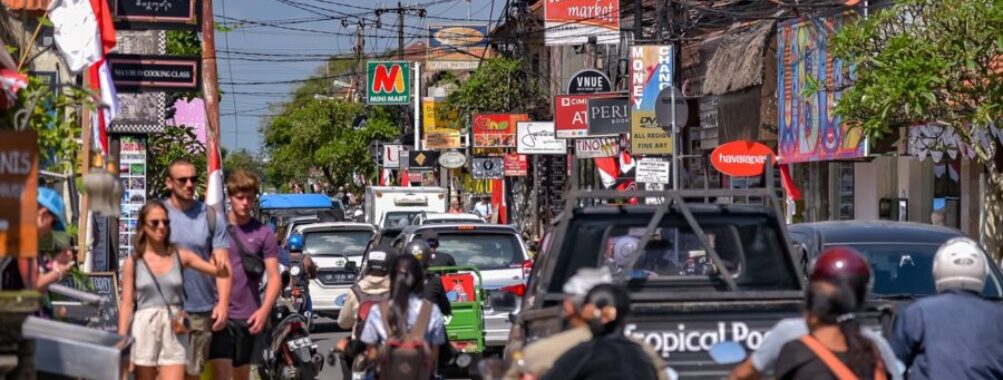
Travel Scams to Avoid in Bali: 7 Insider Tips Every Visitor Must Know
You step off the plane in Bali, and all that beauty, greenery, and those endless smiles just hit you. Honestly, it’s easy to get swept up and forget that scams can pop up when you least expect them. Knowing the most common travel scams in Bali can save you cash, protect your gear, and keep your trip way less stressful.
You might think you’re too savvy to get caught, but those currency exchange tricks, pushy transport hustlers, and sneaky rental agents? They’re everywhere. I’ve watched even the most experienced travelers fall for them. So, let’s make sure you don’t end up as another cautionary tale.
If you want to enjoy your Bali adventure without the hassle, it’s worth knowing what to look out for.
Table of Contents
- Key Takeaways
- Currency Exchange and Money Changer Pitfalls
- Identifying Reputable Money Changers
- Avoiding Hidden Fees and Bad Exchange Rates
- ATM Scams and Skimming Risks
- Transport Scams and Rideshare Issues
- Overpriced Taxi Rides and Meter Tricks
- Fake Blue Bird Taxis
- Scooter Rental and Driving Dangers
- International Driver’s License Checks
- Scooter Rental Damage Disputes
- Helmet Policy Enforcement and Fines
- Alcohol and Food Scams
- Methanol Poisoning from Cheap Arak
- Counterfeit Alcohol Risks
- Fake Tickets, Entrance Fees, and Closed Attraction Scams
- Fake Ticket Sellers at Tourist Attractions
- Scams Involving Closed or Restricted Sites
- Unauthorized Guides and Activity Providers
- Unlicensed or Pushy Guides
- Scams at Popular Tourist Sites
- Theft, Pickpocketing, and Personal Safety
- Pickpocket Hotspots and Distraction Tactics
- Bag Snatching on Scooters
- Drug Scams and Legal Traps
- Drug Offers from Street Sellers
- Police Sting Operations
- Airport Arrivals and Porter Tricks
- Aggressive Porter Demands
- Frequently Asked Questions
- What are the common currency exchange scams travelers face in Bali?
- How can one identify and avoid transportation frauds in Bali?
- What deceptive practices should tourists be aware of at Bali markets?
- Can you elaborate on the beach vendor scams and how to sidestep them?
- What should tourists know about counterfeit goods when shopping in Bali?
- What tactics do scammers use to target travelers with fake tour offers?
- Book Your Dream Experience
- More Travel Guides
Key Takeaways
- Scammers target tourists with money exchanges and transport
- Staying alert helps you keep your belongings and budget safe
- A few smart habits will keep you clear of the worst traps
Currency Exchange and Money Changer Pitfalls
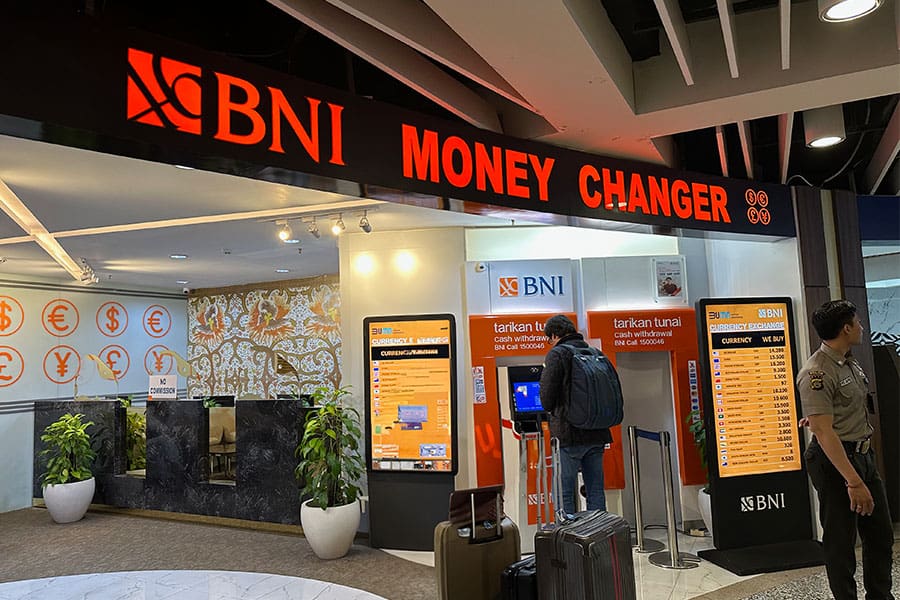
Changing money in Bali? Seems straightforward, but trust me, it’s a minefield if you’re not careful. Take your eyes off your cash for a moment, and you could lose thousands of rupiah before you even realize it.
Identifying Reputable Money Changers
Those official-looking booths? They aren’t always what they seem. I’ve seen folks get drawn in by a big “AUTHORIZED” sign, only to realize too late that something was off. Stick to big, established money changers in busy areas. Ignore those tiny street stalls boasting rates that sound too good—because, let’s face it, they usually are.
Look for:
- Photo ID on staff (if they won’t show it, just leave)
- No “commission-free” offers—that’s often a lure
- Sealed glass counters so you can watch your money
Count your money twice before you hand anything over, and never let your cash out of sight. If someone tries to distract you with a joke or a story, that’s your sign to get more alert.
Avoiding Hidden Fees and Bad Exchange Rates
Rates and surprise fees can get sneaky. You’ll see a great rate outside, but inside, suddenly it’s lower—or you get shortchanged while someone “counts” your money for you.
I always ask exactly how much I’ll get before I hand over anything, then count my notes right there. If you’re extra cautious, jot it down first. If something feels off, don’t hesitate—just walk away.
Skip glass booths that look empty or sketchy. Go for clear signage, locked doors, and decent lighting. When in doubt, exchange cash at a bank or your hotel. Sure, the rate might be a bit lower, but the peace of mind is worth it. Honestly, sometimes I just want less drama.
ATM Scams and Skimming Risks
ATMs in Bali? They’re a mixed bag. Street ATMs face more tampering, and skimmers can be subtle. Here’s what I do every time:
- Use ATMs inside banks or big stores—they’re safer and monitored
- Cover your hand when entering your PIN, even if you feel silly
- Gently wiggle the card slot—if it moves, find a different ATM
Withdrawal fees can add up—some machines charge more, and your home bank might too. If the ATM looks weird or the money doesn’t come out right away, cancel and walk. I’d rather spend an extra five minutes being careful than lose my budget before lunch.
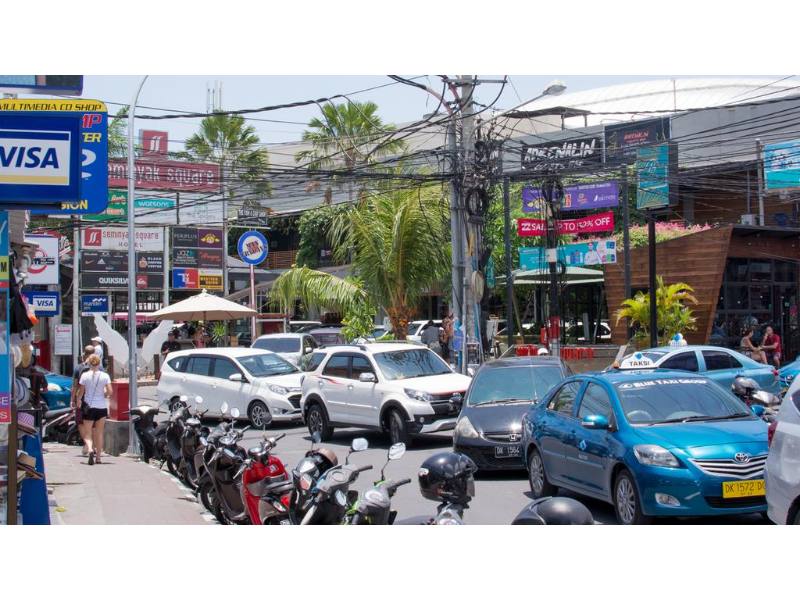
Getting around Bali can be a thrill, but it’s also where a lot of scams happen, especially if you’re fresh off the plane. Some drivers spot newcomers and see an opportunity.
Overpriced Taxi Rides and Meter Tricks
Outside airports and tourist spots, taxis sometimes push a flat rate—often double or triple what the meter would show. I’ve had drivers tell me their meter’s broken or that the road is “dangerous” so the fare goes up. If they won’t use the meter, you’re probably about to get fleeced.
Locals use Grab or Gojek apps to avoid all the price drama. You see the cost up front, and it’s usually fair. If you’re going between cities or resorts, agree on the price before you get in, or insist on the meter.
Here’s how I avoid getting ripped off:
- Ask for the meter before you move
- Use a rideshare app whenever you can
- Confirm the route and price before you go
These habits mean more beach time and fewer arguments. If you’re landing in Bali, check route prices in advance—tools like cheap flight finds can help you spot outliers.
Fake Blue Bird Taxis
Blue Bird Taxis have a solid rep in Bali—sky-blue cars, clear logos, the works. But fakes are everywhere. I’ve seen cars that barely look blue, drivers with no uniform, and fake logos slapped on the side.
The trickiest part? Some imposters camp out near airports and clubs, hoping you’ll hop in. Locals always check the Blue Bird app or look for the real logo and uniform before they get in.
I’ve heard too many stories of travelers who thought they got a good deal, only to get scammed at the end of the ride. To avoid that:
- Only get in Blue Birds with a visible logo, meter, and uniformed driver
- Book through the app or ask your hotel to call for you
- Ignore pushy touts at airports and busy spots
Stay sharp, and you’ll spend your time exploring, not arguing over fares. If you want to compare travel options before you land, Skyscanner can help you spot weird prices.
Scooter Rental and Driving Dangers
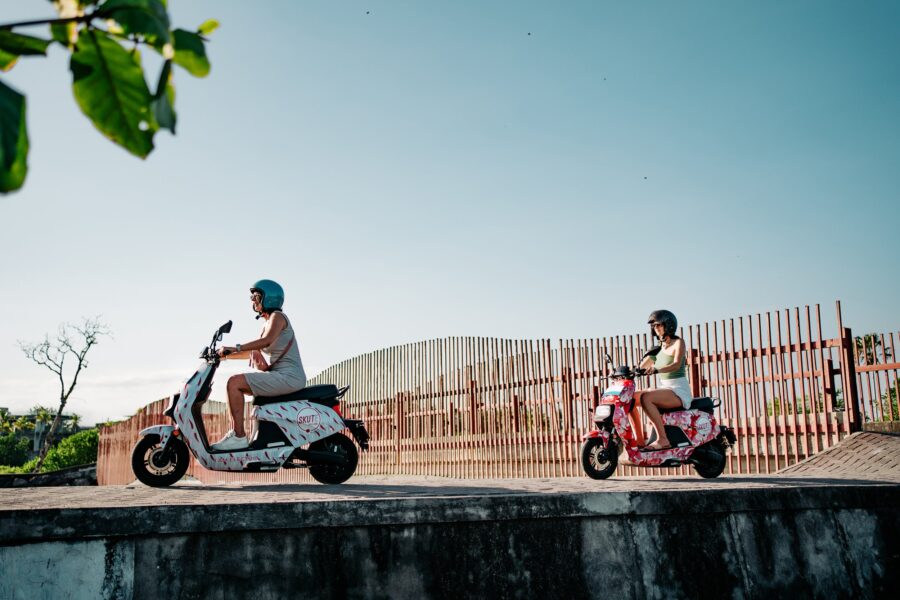
Renting a scooter seems like the ultimate Bali freedom, but it’s where a lot of travelers get tripped up. Whether you’re signing a rental contract or parking for a quick temple stop, scams can creep in.
International Driver’s License Checks
Even if you have your home license, Bali officially requires an International Driver’s Permit (IDP) for scooters. Police check for it all the time, and if you don’t have one, you might end up paying a “fine”—or something that feels more like a shakedown. I’ve watched friends get pulled over near Ubud and not allowed to leave until they paid up. Sometimes, it’s just plain awkward.
Get your IDP before you travel. It’s a cheap booklet, but not having it can ruin your day. Tip: Carry your IDP and home license, keep a photo on your phone, and if police stop you, ask for a real ticket instead of paying a bribe. Handing over cash just keeps the cycle going.
Scooter Rental Damage Disputes
Here’s a classic: you rent a scooter, ride around, and bring it back—then the shop claims you scratched it. Some places, especially near the airport or the beach, make cash accusing tourists of old damage. If they hold your passport as a deposit (never do this!), you’re stuck.
Inspect the scooter with your phone camera before you ride. Snap every scratch, dent, and rusty spot. Make sure the rental guy sees you do it. List the big stuff on your contract, even if it feels awkward. Don’t skip the mirrors, lights, or footrests.
Never leave your passport as collateral—use cash or book through your hotel. If something feels off, just walk away. No scooter is worth that headache.
Helmet Policy Enforcement and Fines
Wearing a helmet isn’t just smart—it’s the law. Yeah, it’s hot, but police will stop you for riding without one (or for using a junky helmet). The fine isn’t huge if your papers are in order, but if you’re missing something, the “fee” can jump.
Always demand a real helmet with your rental. Sometimes they hand you a plastic toy. Make sure the strap works and the visor isn’t busted.
Check:
- Helmet fits
- No cracks or missing straps
- Clean enough to actually wear
I’ve met folks who got fined twice in one day at the same checkpoint. Buckle up, even for a quick ride. Seriously, it’s a tiny habit that’ll save you a world of hassle.
Alcohol and Food Scams
Alcohol scams in Bali can hit your health and your wallet. Drinks made with sketchy ingredients or fake brands can ruin your trip—or worse.
Methanol Poisoning from Cheap Arak
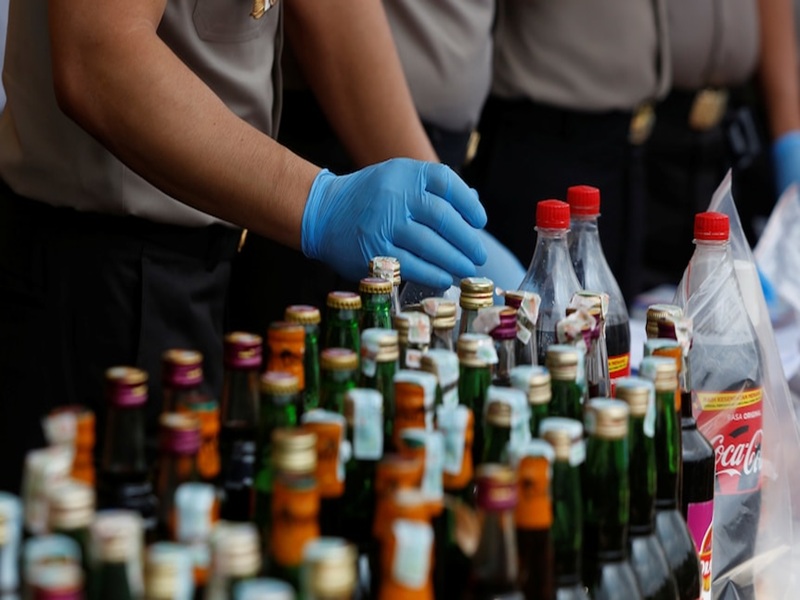
Let’s talk arak. This local rice or palm liquor is everywhere, but the cheap stuff can be dangerous. I’ve met travelers who regretted those cheap cocktails—a lot of bars, especially the tiny ones, mix drinks with bootleg arak to save money.
Some of this arak contains methanol, which isn’t just a hangover risk—it can make you sick, blind, or worse. A friend of mine tried a “free welcome shot” in Kuta and ended up in the hospital for two days. That’s not how you want to spend your holiday.
To avoid methanol:
- Stick to sealed bottles in reputable bars and restaurants
- Skip the crazy-cheap buckets and unknown spirits, even if it’s happy hour
- Don’t be afraid to ask what’s in your drink or check reviews before you go, especially in party towns
Counterfeit Alcohol Risks
Fake booze isn’t just about arak. You’ll find fake vodka, rum, even big-name brands. Sometimes it’s watered down, sometimes it’s just mystery chemicals. Not exactly what you want on your vacation.
The worst spots for fake booze? Tiny shops or beach sellers offering “too good to be true” prices. I once bought a bottle of gin at a mini-mart, and it tasted like cleaning fluid. I poured it out—lesson learned.
If you want to drink:
- Buy sealed bottles from big supermarkets like Pepito or Circle K
- Avoid unbranded or re-filled bottles
- Watch bartenders pour your drinks—good places in Seminyak or Canggu usually let you see the bottle
Small choices here make a big difference. Don’t let a bad bottle ruin your trip. Your health is worth passing up a bargain, even if everyone else is going for it.
Fake Tickets, Entrance Fees, and Closed Attraction Scams
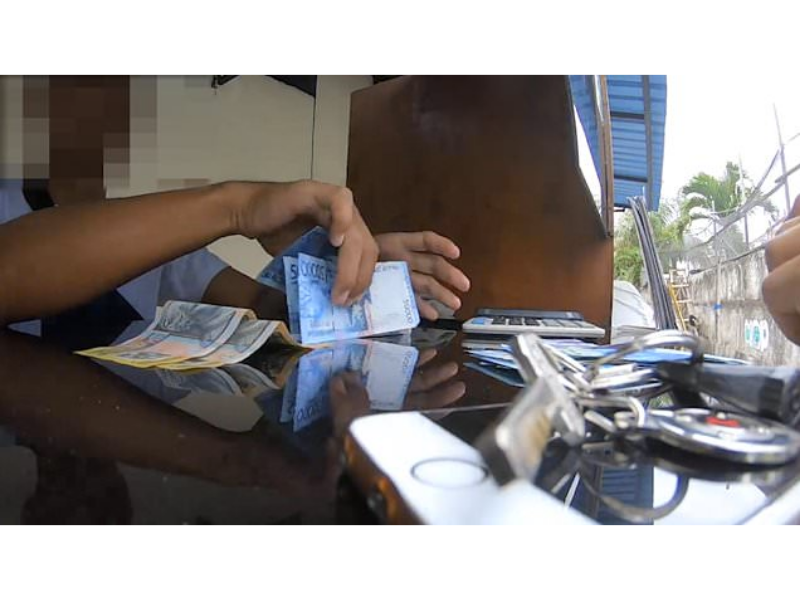
Paying for the wrong ticket or getting turned away at a gate because of a scam can sour your whole day in Bali. Imagine traveling all that way and discovering the “official” guide or ticket you paid for is actually worthless.
Fake Ticket Sellers at Tourist Attractions
Getting caught by fake ticket sellers in Bali is easier than most people think, especially near temples and the big landmarks. I’ll admit, I nearly fell for it myself at Uluwatu Temple—a guy in a crisp shirt, clipboard in hand, promised “express entry” tickets. He seemed legit, right down to the logo, but something just felt off, so I walked over to the main counter instead.
You’ll notice these sellers hanging out by the entrances or even way down the path leading up to the site. Sometimes they’ll spin a story about a special, one-day-only deal. You hand over your money, take the “ticket,” and then get a nasty surprise at the gate. It’s frustrating, and honestly, you’re not getting that cash back.
Want to avoid this mess? Always buy your tickets at the official booth or through trusted online platforms. If someone’s being pushy or the deal sounds a little magical, trust your gut—it probably is. When in doubt, ask a staff member in uniform, not the first person who waves you down.
Scams Involving Closed or Restricted Sites
This one really bugs me—it preys on travelers’ uncertainty. You’re just walking up to a landmark and someone suddenly tells you, “Sorry, it’s closed today, but I know a secret spot for a small fee.” They act like they’re doing you a favor, but usually, they’re steering you away from the good stuff and toward a shop that pays them a commission.
I’ve heard plenty of stories about “new government taxes” or “restricted access days,” only for travelers to discover the place was never closed in the first place. Some drivers pull this trick, especially at famous temples or waterfalls. It’s such a classic tourist trap in Bali.
If someone tells you a site is closed or the entry fee just doubled, double-check at the real entrance or look it up online. Don’t get rushed into a “special tour”—it’s almost always more expensive and less interesting. Trust the official signs, not the guy in the parking lot.

Anyone can look official in Bali, especially if you’re a little dazzled by the energy. Locals will offer “special deals” or “secret tours”—some are genuine, but plenty are just out to make a quick buck. If you’re not sure what to look for, it’s easy to get caught up.
Unlicensed or Pushy Guides
You’ll see people hanging out near attractions or even outside your hotel, offering to guide you for the day. Many don’t have a license, so there’s no accountability. They talk fast, steer you around the official counters, and make everything seem urgent—classic pressure moves.
I got cornered at Tanah Lot my first time in Bali. The guy insisted he was the only way to see the “real” temple, but when I quietly checked with a staff member, they just shook their head. Here’s what to look out for:
- No valid guide ID or badge
- They tell you to skip the official entrance
- They say the price is “just for you”
- You feel rushed or uneasy
Booking with a licensed guide isn’t just safer—it’s a relief, honestly.
Scams at Popular Tourist Sites

Hotspots like Ubud Monkey Forest, Besakih Temple, and Tegallalang Rice Terraces attract their fair share of scammers. Some pose as “official” helpers or claim you’ve broken some rule, then demand a “fine” or extra fee. Others invent new ticket prices or insist on “required” donations.
If you pause too long and look confused (I do this all the time when it’s crowded), someone might show up with a lanyard and a big grin, offering to “explain everything” for a fee. Real staff usually wear uniforms and won’t hassle you for extra cash.
How to dodge scams at Bali’s tourist sites:
- Buy tickets only at official counters
- Ignore random “fees” from people without ID
- Politely decline help you didn’t ask for
- Trust your instincts. If it feels weird, it probably is
Don’t let anyone rush you. Take a second, check the signs, and if you’re not sure—ask someone behind a real counter or a uniformed staff member. Missing out on one “exclusive” experience is better than getting scammed.
Theft, Pickpocketing, and Personal Safety

Petty theft in Bali is a real thing, especially in touristy spots. Most of it’s fast, opportunistic, and preventable if you know the tricks (and keep an eye on your sunglasses).
Pickpocket Hotspots and Distraction Tactics
Pickpockets love crowds. Street markets, temples, and busy beaches are their playgrounds. If you feel a nudge or a brush, don’t ignore it—it could be your wallet disappearing.
Distraction is their favorite move. Maybe someone asks for directions or “accidentally” spills something on you, while their friend grabs your camera. I watched it happen at Ubud Market—a tourist got “help” with a map, but lost a backpack instead. They’re slick.
Protect yourself with a crossbody bag and zipped pockets. Never keep your phone or wallet in your back pocket. Leave the flashy jewelry at home. Money belts and neck pouches might feel old-school, but they work.
If you’re a gadget lover, get insurance for your valuables before you leave. Lightweight travel gear with security features is worth it.
Bag Snatching on Scooters
Bag snatching from scooters is a real threat, especially in places like Canggu, Kuta, and Seminyak. I’ve watched it happen outside a café—not just a rumor.
Here’s how it usually goes: someone on a scooter spots your bag, grabs it, and speeds off before you even react. Sometimes people get hurt if they try to hold on. It’s scary.
Carry your bag on the side away from the road and keep it close. If you hear a scooter coming up fast, stay alert. Never hang your bag loosely, especially if you’re on a bike yourself.
A small, tough crossbody bag worn in front is way harder to snatch. Some travelers carry a cheap decoy bag with nothing important inside. Don’t flash expensive accessories or phones on busy streets.
Grab travel insurance that covers theft, and if you do get targeted, report it to local authorities right away. Better to be safe than spend your trip replacing a passport.
Drug Scams and Legal Traps
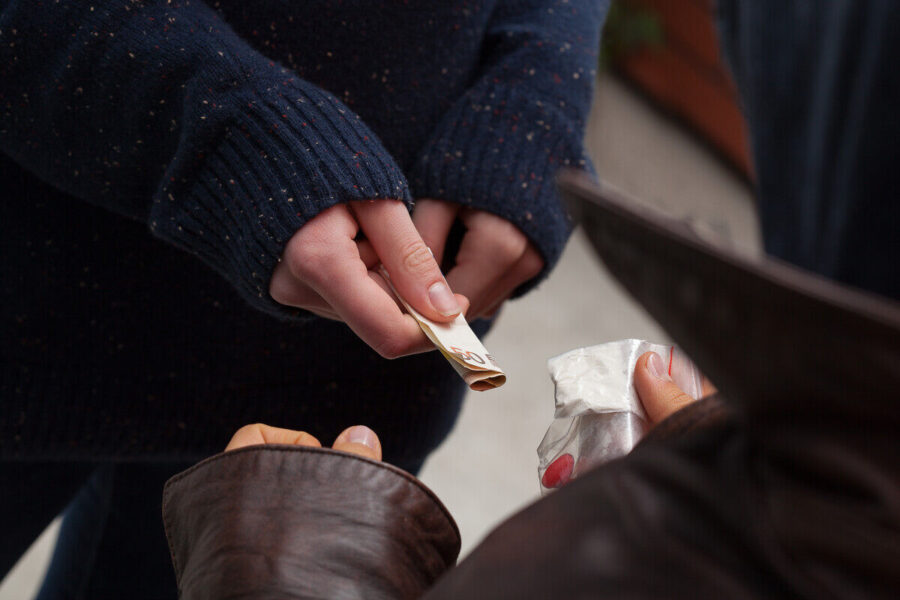
Drugs in Bali are a massive risk, and not just for your health. Indonesia’s laws are strict—what looks harmless can land you in serious trouble.
Drug Offers from Street Sellers
Walking through Kuta or Seminyak at night, someone will probably whisper, “magic mushrooms?” or “good stuff?” in your ear. It seems harmless, but it’s a trap.
These sellers aren’t your friends, and what they’re selling is never safe. Sometimes it’s just fake herbs, sometimes it’s laced with something dangerous. And you never know who’s watching. I’ve seen travelers try to brush these guys off, but if you stop to chat, they get pushy.
Here’s the real danger: many sellers work in groups and keep track of tourists who seem interested. Say yes, and you’re not just risking bad drugs—you’re on someone’s radar.
- Fake substances: You might just lose your money, or worse.
- Health risks: Laced or toxic stuff isn’t rare.
- Legal danger: Even holding the wrong bag can get you arrested.
Police Sting Operations
Nobody really warns you about this, but sometimes those friendly street sellers are working with corrupt police. It’s a setup that’s trapped more than a few travelers and can wreck your trip.
After a sale, some sellers tip off the police, who swoop in before you know it. Sometimes it’s not even real police—just someone looking for a bribe. I’ve heard stories of travelers paying huge amounts just to avoid jail.
Don’t think you can talk your way out of it. Drug laws here are brutal—way harsher than you’re probably used to. Your travel insurance won’t help if you get caught. Penalties range from big fines to years in prison, so don’t risk it.
If you get approached, just keep walking. Don’t joke, don’t accept anything, not even as a “favor.” This is not the time for making new pals.
Airport Arrivals and Porter Tricks
Arriving in Bali can be chaotic, especially after a long-haul flight. The airport’s crowded, and scams can start before you even leave the terminal.
Aggressive Porter Demands
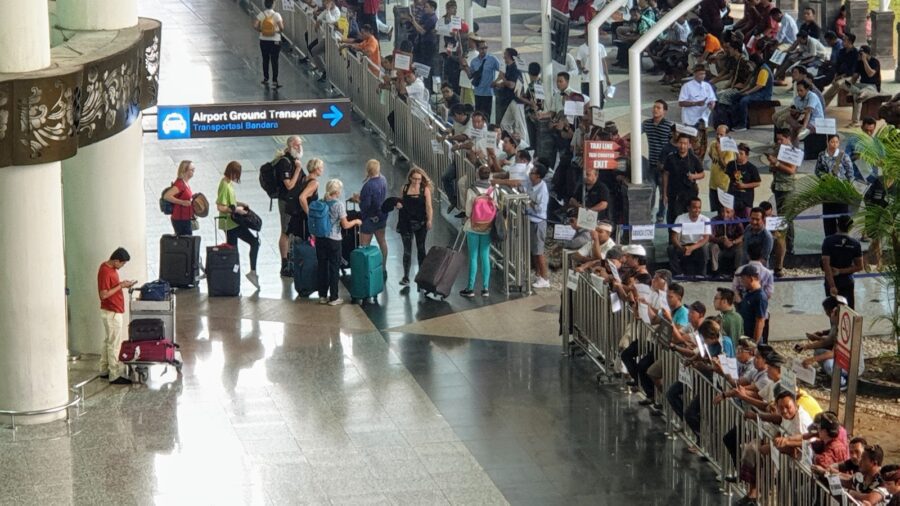
Once you’ve grabbed your bag, you’ll probably get swarmed by airport porters offering help. Sometimes, they don’t even ask—they just grab your suitcase and start walking, expecting you to follow. I got completely turned around my first time and ended up trailing my bag like a duckling.
When you get outside, the porter might demand a huge tip. You might expect to give a polite thank you and a small tip (20,000 rupiah is fair), but some demand triple or more—sometimes even refusing to give back your luggage until you pay up.
- Say “no thank you” firmly if you don’t want help. Hold your ground.
- If you use a porter, agree on a price before they touch your bag.
- Remember, airport trolleys are free—no porter needed unless you really want one.
Getting hustled right after you land is not the best way to start your trip. Trust your gut, stay alert, and don’t let anyone rush you.
Frequently Asked Questions
Scams in Bali come in all shapes, from sneaky currency tricks to pushy market sellers. I’ve seen plenty myself, but staying alert and a little skeptical really helps.
What are the common currency exchange scams travelers face in Bali?
Currency exchange in Bali can be confusing, especially with all those zeros. Some unofficial changers offer great rates to draw you in, then use fast hands or fake math to shortchange you.
Count your cash carefully before you leave, and stick to authorized money changers or banks. If the rate sounds too good to be true, that’s your sign.
How can one identify and avoid transportation frauds in Bali?
Transport scams range from rigged meters in taxis to drivers who “get lost” on purpose to raise the fare. I’ve even met “official” drivers at the airport flashing badges that turned out to be fake.
Book rides with trusted apps like Grab, or through your hotel. If you take a taxi, insist on the meter or agree on a price before getting in. And don’t hesitate to walk away if something feels off—it’s your vacation, after all.
What deceptive practices should tourists be aware of at Bali markets?
Bali markets thrive on bargaining, but some sellers love to toss out wild starting prices—especially if you look like you just landed. I’ve seen vendors swap out an item for a lower-quality version right at the last second after you’ve agreed to buy.
Slow down, check everything closely before handing over cash, and don’t hesitate to say no or just walk away. Honestly, carrying small bills and flashing a friendly grin has opened doors for me more than once.
Can you elaborate on the beach vendor scams and how to sidestep them?
Beach vendors in spots like Kuta or Seminyak can be relentless. Whether it’s souvenirs, massages, or those “temporary” tattoos, they’ll often quote prices that seem straight out of a tourist trap playbook.
Some vendors invent random fees, like a “surfboard charge,” or hand you snacks without mentioning the price. I always ask for prices upfront and double-check if that’s per item or for everyone in my group.
If you’re just trying to chill, a firm but polite “no, thank you” usually does the trick. And please, don’t leave your stuff lying around—walk off for a dip, and your belongings might just disappear.
What should tourists know about counterfeit goods when shopping in Bali?
It’s hard to miss the endless stands selling knockoff sunglasses, fake designer bags, and “authentic” brand tees. I’ll admit, grabbing Ray-Bans for a few bucks is tempting, but you’ve got to keep your expectations realistic.
If you decide to buy, just remember you’re not getting the real deal. And a word of warning—customs officers back home aren’t exactly thrilled if they spot that “Louis Vuitton” in your luggage.
What tactics do scammers use to target travelers with fake tour offers?
You’ll spot fake tour stalls springing up in busy areas, all flashy signs and promises of “exclusive” trips to waterfalls or temples.
They’ll ask for payment upfront, and honestly, sometimes they just vanish. Other times, you’ll get shuttled off to some random spot that’s nothing like what they described.
Here’s something I always do: I dig for recent reviews online, or I’ll actually chat with my hotel staff for their honest take before I book anything. If you can, just pay a deposit rather than the whole amount.
Don’t let the pressure of a “today-only” deal or a pushy seller rush you. Real tours don’t need hard sells, and your trip’s going to be so much better if you stick with operators people genuinely trust.



